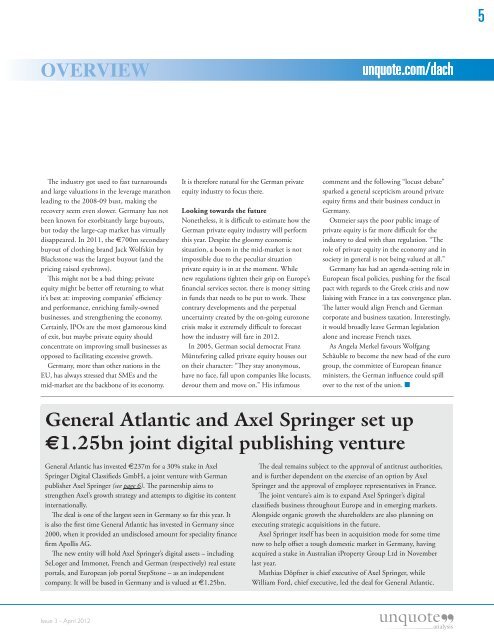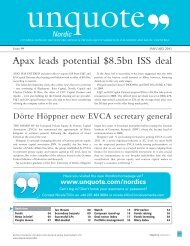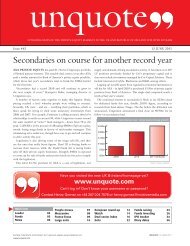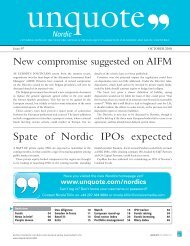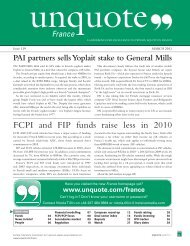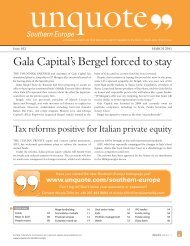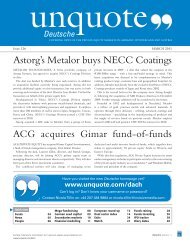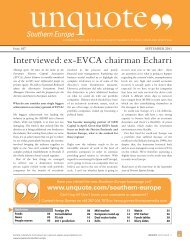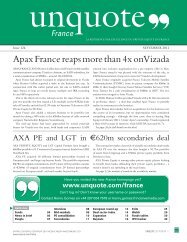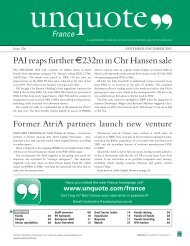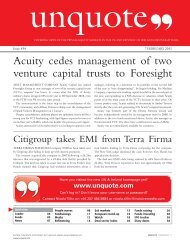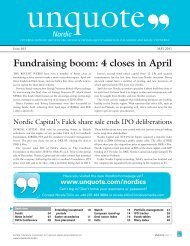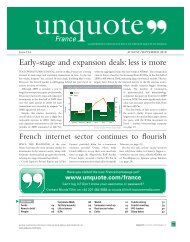latest digital edition of Deutsche unquote
latest digital edition of Deutsche unquote
latest digital edition of Deutsche unquote
Create successful ePaper yourself
Turn your PDF publications into a flip-book with our unique Google optimized e-Paper software.
Overview<br />
The industry got used to fast turnarounds<br />
and large valuations in the leverage marathon<br />
leading to the 2008-09 bust, making the<br />
recovery seem even slower. Germany has not<br />
been known for exorbitantly large buyouts,<br />
but today the large-cap market has virtually<br />
disappeared. In 2011, the €700m secondary<br />
buyout <strong>of</strong> clothing brand Jack Wolfskin by<br />
Blackstone was the largest buyout (and the<br />
pricing raised eyebrows).<br />
This might not be a bad thing: private<br />
equity might be better <strong>of</strong>f returning to what<br />
it’s best at: improving companies’ efficiency<br />
and performance, enriching family-owned<br />
businesses, and strengthening the economy.<br />
Certainly, IPOs are the most glamorous kind<br />
<strong>of</strong> exit, but maybe private equity should<br />
concentrate on improving small businesses as<br />
opposed to facilitating excessive growth.<br />
Germany, more than other nations in the<br />
EU, has always stressed that SMEs and the<br />
mid-market are the backbone <strong>of</strong> its economy.<br />
Issue 3 – April 2012<br />
It is therefore natural for the German private<br />
equity industry to focus there.<br />
Looking towards the future<br />
Nonetheless, it is difficult to estimate how the<br />
German private equity industry will perform<br />
this year. Despite the gloomy economic<br />
situation, a boom in the mid-market is not<br />
impossible due to the peculiar situation<br />
private equity is in at the moment. While<br />
new regulations tighten their grip on Europe’s<br />
financial services sector, there is money sitting<br />
in funds that needs to be put to work. These<br />
contrary developments and the perpetual<br />
uncertainty created by the on-going eurozone<br />
crisis make it extremely difficult to forecast<br />
how the industry will fare in 2012.<br />
In 2005, German social democrat Franz<br />
Müntefering called private equity houses out<br />
on their character: “They stay anonymous,<br />
have no face, fall upon companies like locusts,<br />
devour them and move on.” His infamous<br />
<strong>unquote</strong>.com/dach<br />
comment and the following “locust debate”<br />
sparked a general scepticism around private<br />
equity firms and their business conduct in<br />
Germany.<br />
Ostmeier says the poor public image <strong>of</strong><br />
private equity is far more difficult for the<br />
industry to deal with than regulation. “The<br />
role <strong>of</strong> private equity in the economy and in<br />
society in general is not being valued at all.”<br />
Germany has had an agenda-setting role in<br />
European fiscal policies, pushing for the fiscal<br />
pact with regards to the Greek crisis and now<br />
liaising with France in a tax convergence plan.<br />
The latter would align French and German<br />
corporate and business taxation. Interestingly,<br />
it would broadly leave German legislation<br />
alone and increase French taxes.<br />
As Angela Merkel favours Wolfgang<br />
Schäuble to become the new head <strong>of</strong> the euro<br />
group, the committee <strong>of</strong> European finance<br />
ministers, the German influence could spill<br />
over to the rest <strong>of</strong> the union. n<br />
General Atlantic and Axel Springer set up<br />
€1.25bn joint <strong>digital</strong> publishing venture<br />
General Atlantic has invested €237m for a 30% stake in Axel<br />
Springer Digital Classifieds GmbH, a joint venture with German<br />
publisher Axel Springer (see page 6). The partnership aims to<br />
strengthen Axel’s growth strategy and attempts to digitise its content<br />
internationally.<br />
The deal is one <strong>of</strong> the largest seen in Germany so far this year. It<br />
is also the first time General Atlantic has invested in Germany since<br />
2000, when it provided an undisclosed amount for speciality finance<br />
firm Apollis AG.<br />
The new entity will hold Axel Springer’s <strong>digital</strong> assets – including<br />
SeLoger and Immonet, French and German (respectively) real estate<br />
portals, and European job portal StepStone – as an independent<br />
company. It will be based in Germany and is valued at €1.25bn.<br />
The deal remains subject to the approval <strong>of</strong> antitrust authorities,<br />
and is further dependent on the exercise <strong>of</strong> an option by Axel<br />
Springer and the approval <strong>of</strong> employee representatives in France.<br />
The joint venture’s aim is to expand Axel Springer’s <strong>digital</strong><br />
classifieds business throughout Europe and in emerging markets.<br />
Alongside organic growth the shareholders are also planning on<br />
executing strategic acquisitions in the future.<br />
Axel Springer itself has been in acquisition mode for some time<br />
now to help <strong>of</strong>fset a tough domestic market in Germany, having<br />
acquired a stake in Australian iProperty Group Ltd in November<br />
last year.<br />
Mathias Döpfner is chief executive <strong>of</strong> Axel Springer, while<br />
William Ford, chief executive, led the deal for General Atlantic.<br />
5


